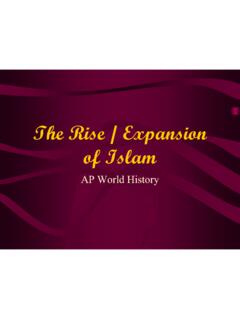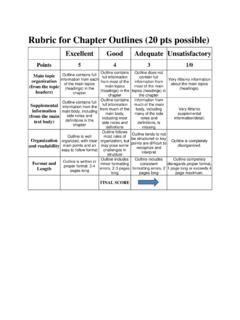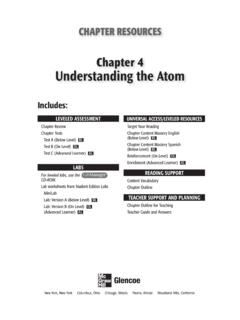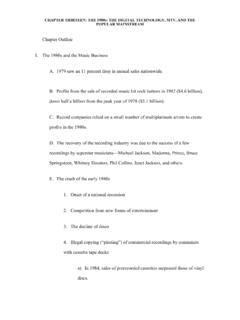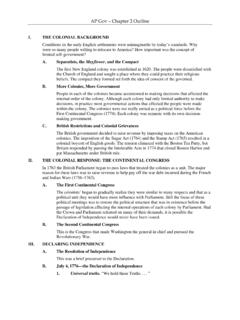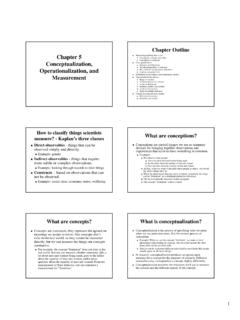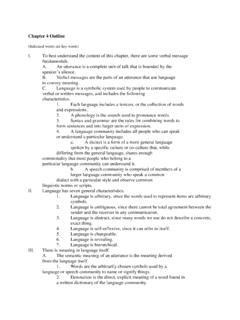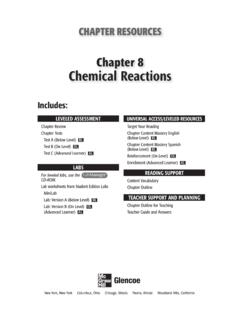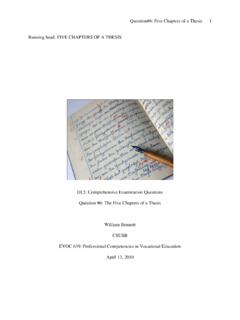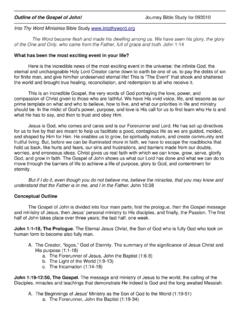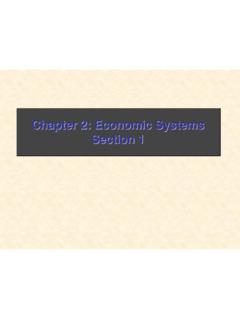Transcription of American Government Notes: Chapter 20 Civil Liberties ...
1 American Government Chapter 20 Civil Liberties : protecting Individual rights Section 1 a. Due Process of Law B. The Meaning of Due Process a. Constitution contains two statements about due process i. 5th Amendment 1. Federal Government cannot keep any person from life, liberty, or property, without due process of law. ii. 14th Amendment 1. State Governments have the same limit on power as the federal Government b. Due Process is generally determined by the supreme court on a case-by-case basis c. Generally Due Process means: i.
2 Government must act fairly and within established rules ii. Substantive Due Process 1. Government must create fair policies and laws iii. Procedural Due Process 1. Government must use fair procedures and methods d. The 14th Amendment and the Bill of rights i. Bill of rights apply to the National Government only ii. 14th Amendment applies the Bill of rights to States notes : Chapter 20 notes : Page 1 C. Police Power a. Authority of each state to act to protect and promote the public health, safety, morals, and general welfare i.
3 In other words to help people live well b. Often protecting people, creates a conflict with Civil rights i. Courts then have to maintain a balance between the two 1. Example: Drunk Driving c. Search Warrant i. A court order authorizing a search d. Courts have held that public well-being was the most important i. Promote health, limit sale of alcoholic beverages ii. Promote safety, forbid concealed weapons, use of seat belts, punish drunk drivers iii. Promote morals, outlawing gambling, sale of obscene materials, prostitution iv.
4 Promote the general welfare, education laws, limit profits of public utilities D. The Right of Privacy a. Not specifically mentioned in constitution, however courts have continually held it to be the right to be free, except in very limited circumstances, from unwanted governmental intrusions into one s privacy. (Stanley v. Georgia, 1969) b. Roe V. Wade i. Most controversial case involving the right of privacy ii. The Supreme Court found a Texas law unconstitutional 1. The law made abortion a crime notes : Chapter 20 notes : Page 2 c.
5 Later Reproductive rights Cases i. The Courts have made many revisions since Roe V. Wade, but the basic constitutional right still stands Section 2 d. Freedom and Security of the Person E. Slavery and Involuntary Servitude a. Amendment 13 was added to the Constitution in 1865, outlawing slavery or involuntary servitude i. The courts have held that the draft and imprisonment are not classified as involuntary servitude b. The 13th Amendment: Section 2 i. With support of the 13th Amendment, Civil rights Act of 1866, and Civil rights Act of 1964, outlaw racial discrimination 1.
6 Bias, Unfairness F. The Right to Keep and Bear Arms a. 2nd Amendment states A well regulated militia being necessary to the security of a free State, the right of the people to keep and bear arms, shall not be infringed Constitution i. Many politicians argue that the amendment also supports an individual s right to bear arms ii. State s have the right to limit arms G. Security of Home and Person a. The 3rd Amendment i. Forbids the housing of soldiers in private homes 1. Never been the subject of a Supreme Court case notes : Chapter 20 notes : Page 3 b.
7 The 4th Amendment i. Designed to prevent the use of writs of assistance 1. Blanket search warrants c. Probable Cause i. Police officers cannot search for evidence unless they have a warrant 1. Must be based on probably cause a. A reasonable suspicion of crime d. Arrest i. The Seizure of a person ii. Do not need a warrant to arrest an individual e. Automobiles i. The Court has held that officers do not need search warrants for vehicles 1. Just need probable Cause f. The Exclusionary Rule i. Evidence gained as the result of an illegal act by police cannot be used at the trial of the person from whom it was seized 1.
8 Adopted by the Courts, even though not explicitly stated in the 4th amendment ii. Rule was laid down in Weeks v. United States,1914 g. Map v. Ohio i. 1961 case expanded the Exclusionary rule to states based on the 14th Amendment h. Cases Narrowing the Scope of the Exclusionary Rule i. Multiple cases through the years have allowed some police mistakes regarding evidence i. Drug Testing i. The Court has held that they can be conducted without either warrants or even any indication of drug use by those who must take them notes : Chapter 20 notes : Page 4 j.
9 Wiretapping i. Kratz v. United States, 1967 found evidence found through wiretapping was not eligible in court 1. However, recent cases involving cell phone wiretapping has not been found unconstitutional Section 3 k. rights of the Accused H. Habeas Corpus a. Writ of habeas corpus i. Intended to prevent unjust arrests and imprisonments ii. Commands that the prisoner be brought before the court and that the office show cause why the prisoner should not be released 1. Cannot be suspended unless when in cases of Rebellion or Invasion the public Safety may require it a.
10 Abraham Lincoln suspended the writ in 1861 2. Also suspended in Hawaii after Pearl Harbor I. Bills of Attainder a. Legislative act that inflicts punishment without a court trial i. England s parliament during the colonial period pass many bills of attainder J. Ex Post Facto Laws a. A Law passed after the fact i. A criminal law, defining a law or providing for its punishment notes : Chapter 20 notes : Page 5 ii. Applies to an act committed before its passage iii. Works to the disadvantage of the accused b.

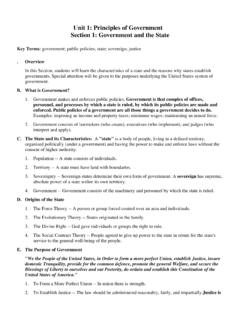

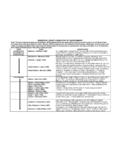
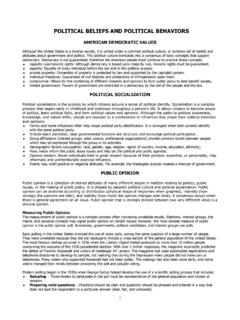

![Europe in the Postclassical Era.ppt [Read-Only]](/cache/preview/3/f/0/5/a/f/4/a/thumb-3f05af4abb01b691e0d84337014c46bf.jpg)
